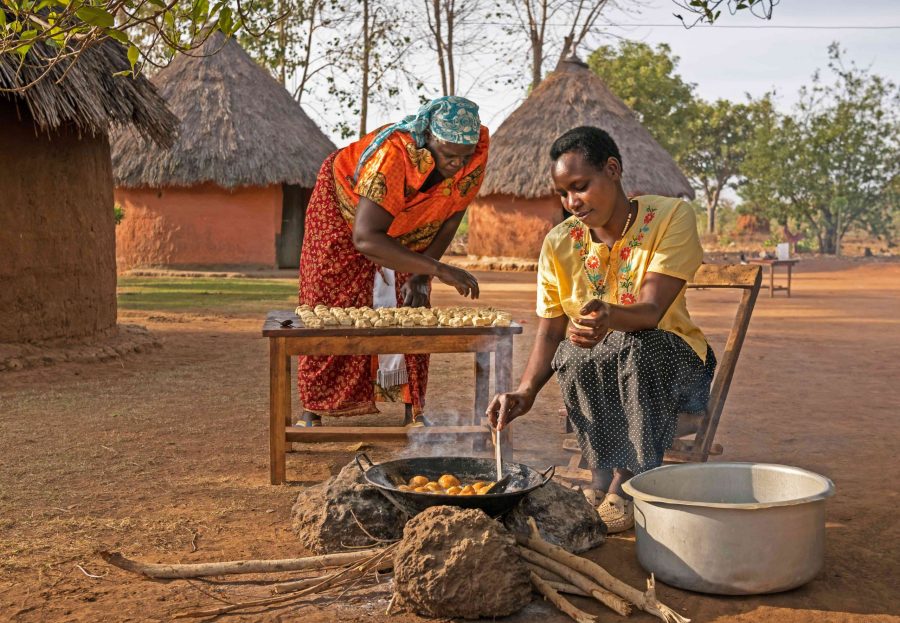In Uganda, nearly half of the population lives on less than $1.90USD per day, a trend that back-dates multiple generations. Individuals living in extreme poverty are given limited access to credit, healthcare, and education, all of which impede their ability to lift themselves out of poverty. Exacerbated by the global food crisis, economic repercussions of the global pandemic, and climate change, escaping the intergenerational cycle of poverty is more difficult than ever.
This was the case for Agnes Alepo of the Onyorai village in Uganda when she was selected to join the Village Enterprise poverty graduation program* in November of 2019. After four months of rigorous business training, she received a seed capital grant to start a business with her friends Adongo and Amodoi. The future appeared bright for Agnes until when, less than a month later, the government of Uganda reported the country’s first confirmed case of Covid-19. None of their business training could have prepared the women for what followed: months of closed borders, suspended public transport, restricted cross-district movement, and imposed nation-wide curfews.
With fear on everyone’s minds, the team’s Village Enterprise business mentor, David Eseru, reached out by telephone. Under normal circumstances, David would travel to each business group’s village to provide his mentorship. With a country-wide lockdown in place, telephone mentoring became the only option, but it also became a lifeline for Agnes, Adongo and Amodoi.
Over the phone, Agnes and her business partners were able to voice all of their concerns and receive advice in real-time. Together, the four of them brainstormed ideas to adapt to the circumstances. Noticing a trend in population migration from cities to villages, the women saw an opportunity to earn money baking and selling cakes directly in their village. However, with transit restricted from the lockdown, they worried that they wouldn’t be able to travel the necessary distance to gather supplies. There was one silver lining: bicycles were not included in the restricted transportation list.

Every week, sometimes twice a week, Agnes rode her bike more than 25 kilometers in search of raw materials. While she was away, her business partners took care of the sales. Through this efficiency, they were able to keep their prices relatively low and villagers started buying their cakes in droves.

With help from their Village Enterprise business mentor, David, the team set weekly targets, motivating them to remain focused on their goals. Through this iterative process, they were able to identify another opportunity to diversify into a new business by setting up a retail shop selling sugar, soap, salt, and other basic necessities.
In under a year, Agnes went from having no economic means to owning not one but several businesses bringing in an income of UGX 200,000 ($57 USD) per month. Supported by her husband, who also contributes to her savings, she has become a trailblazing example in her community, putting away at least UGX 31,000 ($9 USD) per week into her local business savings group. In a time when hospitals were overloaded with Covid cases, Agnes and her business partners were able to provide their families with the necessary means to keep them safe and healthy. One year later, she had saved up UGX 1.4M ($400). She was also able to purchase a cow, something a woman rarely does in her village, as well as chickens and turkeys.

Agnes speaks about how lessons she learned from Village Enterprise continue to inform and animate her life. “Every day I think about how to make more money. I never want to go back to the life we had before Village Enterprise came to us.” She continues, “I would never have done this without my husband’s support, my two fellow co-entrepreneurs, my Village Enterprise mentor, and the members of my business savings group.”
While the extent of Agnes’ formal education stops at the primary school level, her four children, although still young, now talk of going to university one day. In spite of the ongoing Covid-19 pandemic, Agnes feels confident that her newly founded skills and resilience will allow her to handle whatever life throws at her and her family. For the first time in generations, history will not be destiny.

* Agnes and her business partners were part of Village Enterprise’s poverty graduation program funded by the Village Enterprise Development Impact Bond